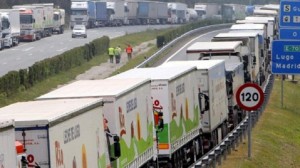The independent Research Centre OPERA* presented (Tuesday 11th May 2010) in Brussels, a new research report that warns that the European Union must encourage agricultural innovation and productivity increases to avoid charges of territorial 'land grabbing.'
Authors of the study are Professor Harald von Witzke of the Humboldt University of Berlin and Steffen Noleppa of agripol - network for policy advice. The research details the development of EU agricultural trade between 1999 and 2008 and quantifies the substantial acreage cultivated in other countries to fulfil Europe's demand for food, animal feed and biofuels. It shows that in 2007/2008 almost 35 million hectares of land beyond European borders was used for the benefit of Europeans, with the EU the world's largest importer of agricultural products.
That's an astonishing figure: it's almost equivalent to the entire territory of Germany," said Professor Ettore Capri, Director of OPERA Research Centre. "This is exactly why we wanted bring these figures to the table so that the decision makers can take them into account."
The report is called 'EU Agricultural Production and Trade: Can More Efficiency Prevent Increasing 'Land-Grabbing' Outside Of Europe?'. It gives the most comprehensive analysis of agricultural trade with Europe, and the impact of this trade on land-use decisions outside the EU. It's the first such analysis embracing all 27 European Member states and it covers approximately 40 crops and 240 tradable commodity groups - more than any recent study available.
It finds that the EU has become the world's largest net importer of agricultural produce, and therefore the largest user of agricultural land that is not its own. In 2008 the 27 Member states of the EU exported US$127.6 billion of agricultural commodities, but imported produce valued at US$173.1 - a net import of US$45.5 billion.
The report's authors use a complex indicator-based approach to convert the EU's international agricultural trade data into trade in 'virtual' land. "For instance, if it takes 'X' hectares to produce one metric ton of wheat, then exporting that wheat to Europe is equivalent to exporting 'X' hectares of virtual land," said Humboldt University's Harald von Witzke, leading author of the 'Land-Grab' report.
The EU is now a net exporter of virtual land in wheat and coarse grains only. It's importing virtual land in all other commodities and commodity groups. Soybean alone accounts for more than 50% of the net import of virtual land. "We're quick to raise our eyebrows at the acquisition of land in other countries by resource-hungry nations," von Witzke said. "But we're doing exactly the same, albeit virtually through market forces instead of foreign investment."
The Humboldt University/agripol analysis shows that between 1999 and 2008 Europe's use of foreign land for its own agricultural production has grown by 40%, or 10 million hectares. It says the issue is compounded by change in land use in many virtual land-exporting countries, and increasing greenhouse gas emissions from the conversion from forests, grasslands and refuge into cropland.
It analyses the effect of three potential scenarios within a reformed European agricultural policy; enhancing agricultural yields, increasing area under organic farming, and expanding the use of biofuels. Of these, enhancing the yields in Europe, seems the solution to reduce circumvent externalisation of food sources.
The report maintains that encouraging agricultural innovation and increasing productivity in major crops by just 0.3 percentage points per year would reduce the need to farm 5.3 million hectares of cropland outside the EU. If annual incremental growth rate in the EU's agricultural production had doubled between 1999 and 2008, it says, the importation of virtual land would have been about 10 million hectares less and would have remained roughly at the 1999 level.
By contrast, expanding the acreage of organically farmed land to 20% would increase virtual land importation by almost 30%. And policies to achieve the EU's 10% biofuel objective would also increase the rate of land-grabs.
OPERA's Policy Team Coordinator, Alexandru Marchis says the EU is not only morally obliged to enhance agricultural yields and use its own land as effectively as possible, but should also be looking at the issue from a strategic perspective. The term 'land grabbing' has hugely emotive connotations but the EU has to acknowledge the global implications of its policy decisions and the effects generated by not tackling the issue of competitiveness and productivity of European agriculture.
"Long-term food security is a major issue. The EU should be working now to encourage all means of increasing the productivity of our farmland," Member of the European Parliament (MEP) Mairead McGuinness said at the panel discussion which followed the event. "The challenge is to produce more using less of our scarce resources; land, energy and water. The challenge is also to produce better in terms of high quality, high value produce. "
"To secure long-term productivity growth in agriculture not just in Europe, but around the world, it is necessary for countries to provide increased public funding for agricultural research and to create a policy environment that encourages private research investment," added McGuinness.
Contact Information
Alexandru Marchis
OPERAPl. du Champs de Mars, 2
Brussels 1050












